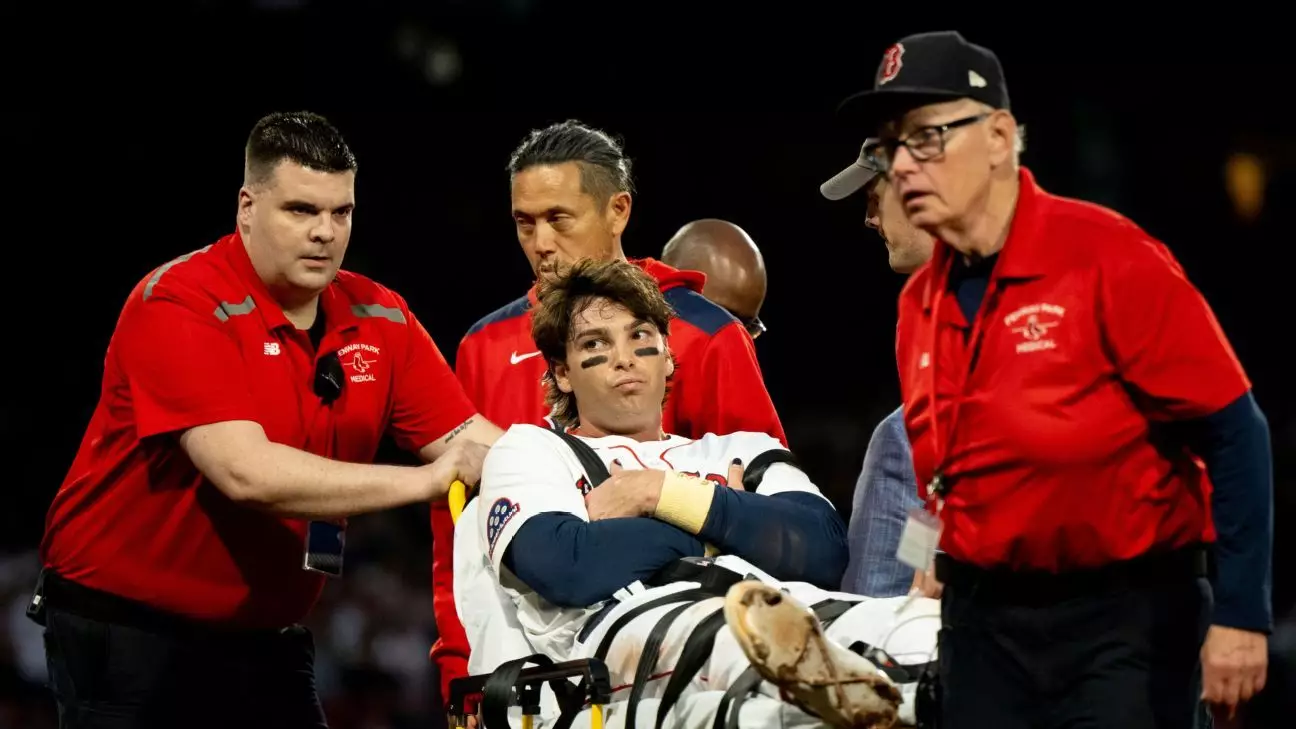In a heartbreaking turn of events, the Boston Red Sox witnessed the unfortunate exit of their young first baseman, Triston Casas, who suffered a ruptured patellar tendon in his left knee. This injury, sustained in a seemingly innocuous moment while sprinting to first base on a slow roller, serves as a sobering reminder of how quickly fortunes can shift in professional sports. As the 25-year-old laid on the field writhing in pain, holding his knee, it became evident that his season had come to a premature end. This occurrence not only affects Casas personally but also resonates deeply within the team’s dynamics and future strategies.
Significance of the Injury
Casas’s injury is particularly significant given its timing and implications. Prior to this setback, he was a player who had shown both promise and potential. A patellar tendon rupture is no ordinary injury; it demands considerable recovery time and poses a risk of being career-altering. Although Casas had struggled offensively with a batting average of merely .182—logging only three home runs and 11 RBIs—the intangible contributions he made to the team, both defensively and in the clubhouse, cannot be understated. Chief baseball officer Craig Breslow addressed this emotional loss, acknowledging that “it’s a big loss,” and highlighted the void Casas leaves, especially given the team’s limited depth at first base.
Recovery and the Road Ahead
In the wake of his surgery, performed by Dr. Eric Berkson at Massachusetts General Hospital, the focus now shifts from disappointment to recovery. The rehabilitation process, a formidable endeavor, will require not just physical strength but also mental fortitude. Manager Alex Cora emphasized that the team is optimistic about Casas returning stronger next season, particularly since he had dedicated considerable effort during the offseason to prepare for a full season of play. This hard work, however, has been overshadowed by his injury, reminding us that sport can be as much about perseverance as it is about skill.
Casas had previously discussed adopting a more relaxed mindset at the plate this season. This philosophy highlights the mental side of sports, where players must balance the hunger for success with the need to remain calm under pressure. As he pivots his focus to rehabilitation, this same mentality may serve him well, enabling him to approach his recovery not merely as a process of physical healing but as an opportunity for personal growth and mental renewal.
Team Impact and Future Prospects
The timing of Casas’s injury creates a ripple effect within the Red Sox organization. With him sidelined, the team will test the resolve and capabilities of other players stepping into the first base role. Infielder/outfielder Abraham Toro was called up from Triple-A Worcester, and he, along with Romy Gonzalez, will attempt to fill the void left by Casas. Such transitions are not without complications; however, they also present opportunities for less seasoned players to demonstrate their potential to the coaching staff.
The Red Sox are actively considering long-term solutions for this pivotal position. Breslow’s assertion that “this is unfortunately an opportunity to explore what’s available” suggests that the management is not only looking internally but also possibly eyeing external talent to fortify the roster. The dynamics of a baseball team often hinge on how well players can adapt to sudden changes, and this scenario will test the adaptability of both the coaching staff and the players involved.
The Cultural and Personal Dimension
Beyond the numbers and the statistics lies a deeper issue: the human element. Triston Casas is not just a player; he is a person with aspirations and dreams that have now been momentarily shattered. The team’s focus on his overall well-being is indicative of a culture that values player health and mental strength. Cora’s remarks about Casas’s critical presence within the clubhouse speak volumes about the importance of camaraderie and support in professional sports. The emotional and psychological ramifications of such injuries extend beyond the player; they reverberate through the entire team environment, making this a collective journey toward recovery rather than a solitary challenge.
As Casas embarks on this arduous path to recovery, he embodies the resilience intrinsic to professional athletes. His story resonates with all who have faced setbacks and inspires hope that, with determination and support, healing—both physical and emotional—can pave the way for a triumphant return. While the road ahead may be long and strenuous, the Red Sox community stands united in faith and encouragement, waiting for the day when Casas rejoins the field, stronger than ever.

